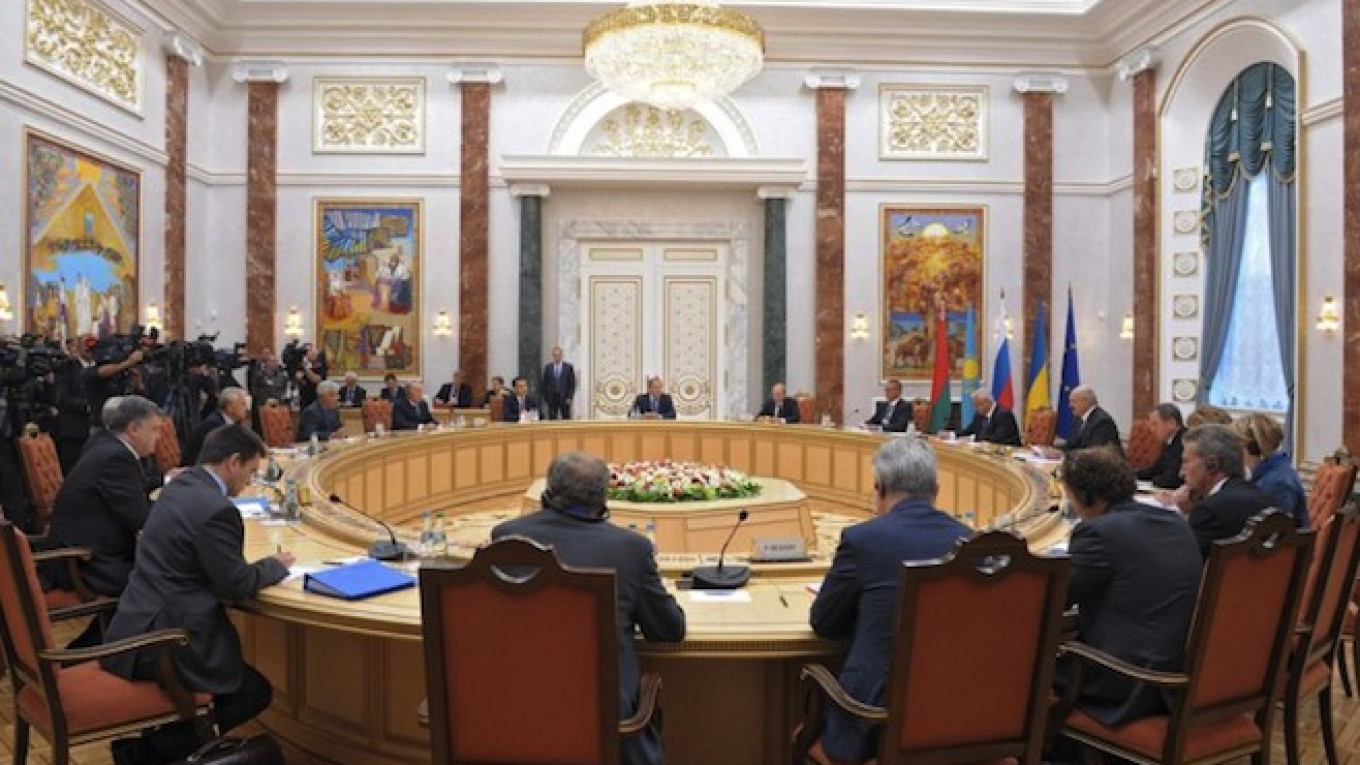The European Union delayed putting more Ukrainian separatists and Russians on its sanctions list on Monday to give a Franco-German peace plan for Ukraine time to work.
The leaders of Ukraine, Russia, France and Germany will meet in Minsk, Belarus, on Wednesday to try to broker a new cease-fire in eastern Ukraine.
To encourage the process while maintaining leverage, EU foreign ministers adopted asset freezes and visa bans on 19 Ukrainian separatists and Russians and nine organizations, but said they would not take effect until Feb. 16.
"The principle of these sanctions remains but the implementation will depend on results on the ground," French Foreign Minister Laurent Fabius told reporters. "We will see by (next) Monday ... how the meeting in Minsk went."
The ministers gathered in Brussels welcomed the glimmer of hope for a deal following a new initiative by German Chancellor Angela Merkel and French President Francois Hollande, saying the addition of new names to the sanctions list could be annulled if things went well in Minsk.
The list targets 14 separatists and five Russians while only one Russian organization was among nine identified. The names were kept confidential for now, but diplomatic sources said they included Russian Deputy Defense Minister Anatoly Antonov.
There was no discussion of lifting any other sanctions if Minsk goes well, diplomats said.
"Until we see Russia comply on the ground we cannot relieve the pressure in any way," said British Foreign Secretary Philip Hammond, adding that the bloc must remain "clear and united in our stand against Russian aggression in Ukraine."
A peace deal would come as a relief to many EU countries that would rather avoid tightening sanctions on Russia, the EU's largest energy supplier, and harming their own economies.
Following the West's economic sanctions on Russia and Moscow's retaliatory ban on most Western food imports, the Ukraine crisis has cost the European Union 21 billion euros ($23.68 billion) in lost exports, Spain's Foreign Minister Jose Manuel Garcia-Margallo said.
Germany Foreign Minister Frank-Walter Steinmeier told reporters he hoped the Minsk meeting would lead to "first steps ... towards a cease-fire." He added: "But I want to say again that this isn't certain."
Foreign ministers crowded around Steinmeier and Fabius at the start of the meeting to hear the latest on the talks.
Lithuania's Foreign Minister Linas Linkevicius voiced scepticism about chances of a peace deal leading to improvements on the ground and said it would be "a logical move" for the United States to send weapons to the Ukrainian army.
"We all expect there will be a diplomatic solution, no one wants war, but we can judge only on the developments on the ground, we cannot trust a single word of the Russian leadership," he said.
Many European leaders, including Merkel, have cautioned against sending arms to Kiev for fear of fanning the conflict.
A Message from The Moscow Times:
Dear readers,
We are facing unprecedented challenges. Russia's Prosecutor General's Office has designated The Moscow Times as an "undesirable" organization, criminalizing our work and putting our staff at risk of prosecution. This follows our earlier unjust labeling as a "foreign agent."
These actions are direct attempts to silence independent journalism in Russia. The authorities claim our work "discredits the decisions of the Russian leadership." We see things differently: we strive to provide accurate, unbiased reporting on Russia.
We, the journalists of The Moscow Times, refuse to be silenced. But to continue our work, we need your help.
Your support, no matter how small, makes a world of difference. If you can, please support us monthly starting from just $2. It's quick to set up, and every contribution makes a significant impact.
By supporting The Moscow Times, you're defending open, independent journalism in the face of repression. Thank you for standing with us.
Remind me later.


